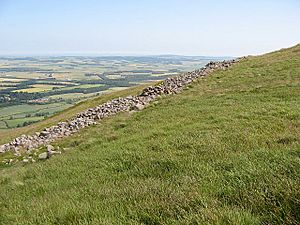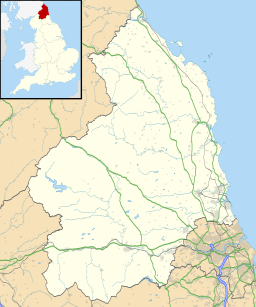Yeavering Bell facts for kids
Quick facts for kids Yeavering Bell |
|
|---|---|

View north-northeast from Yeavering Bell
|
|
| Location | Northumberland, England, UK |
| OS grid | NT929292 |
| Coordinates | 55°33′25″N 2°06′50″W / 55.557°N 2.114°W |
Yeavering Bell is a special hill in northern Northumberland, England. It has two peaks and is part of the Cheviot Hills. This hill is famous because of an ancient hillfort built on its top. A hillfort is like a very old, fortified town or village.
This particular hillfort was once a main gathering place for an ancient tribe called the Votadini. They lived in this area a very long time ago. The name "Yeavering Bell" comes from an old name for the place, "Din Gefron," which means "hill of the goats" in an old Celtic language.
Contents
The Ancient Hillfort
The hillfort on Yeavering Bell is very large, covering about 12 acres (about 5 hectares). It is surrounded by a strong stone wall that was over 10 feet (3 meters) thick. This wall had four entrances. One of these entrances even had a special guard-house to protect it.
Inside the Fort
Inside the main fort, there was another, smaller fort. This inner fort was shaped like an oval and was dug out of the rock. It measured about 13 feet (4 meters) across at its widest point.
Homes on the Hill
All around the sides of Yeavering Bell, and in a valley between Yeavering Bell and another hill called Whitelaw, you can still see the remains of many stone huts. These huts were built simply, often with flat stones. Some of them were grouped together and surrounded by small walls, while others stood alone. You can also find many ancient burial mounds, called barrows, in this area.
How the Fort Was Built
Experts who have studied Yeavering Bell believe the hillfort was built in two main stages. The round buildings inside the fort suggest that people lived there together. However, not all of these buildings were necessarily homes. Their different sizes might have shown how important the people living in them were.
When the buildings of the hillfort were first constructed, they would have looked bright pink! This is because they were made from a local stone called andesite. This stone is pink when it's first dug up, but after a few years of being exposed to the weather, it turns a dull grey.
Yeavering Bell and Saxon History
Yeavering Bell looks down over an important Saxon site in the valley below. This site is called Yeavering. It was mentioned by a famous historian named Bede in his book, Ecclesiastical History of the English People.
From the slopes of Yeavering Bell, you can still see the outlines of the wooden royal hall and other important buildings that were part of the Saxon settlement. These outlines have been marked out in the grass, showing where these ancient structures once stood.
 | William Lucy |
 | Charles Hayes |
 | Cleveland Robinson |


